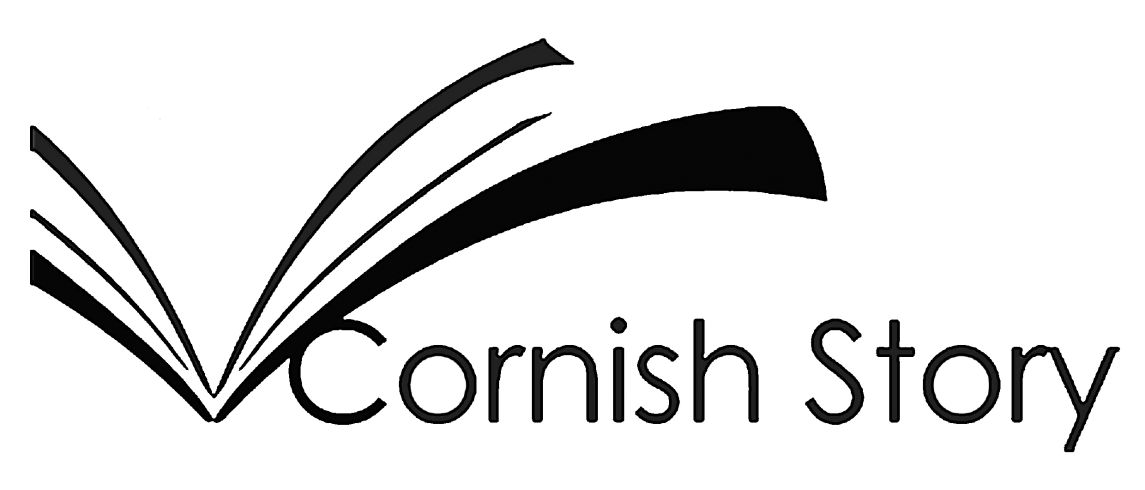Mapping Methodism – Cockwells Primitive Methodist Chapel
Categories Mapping Methodism, Projects0 Comments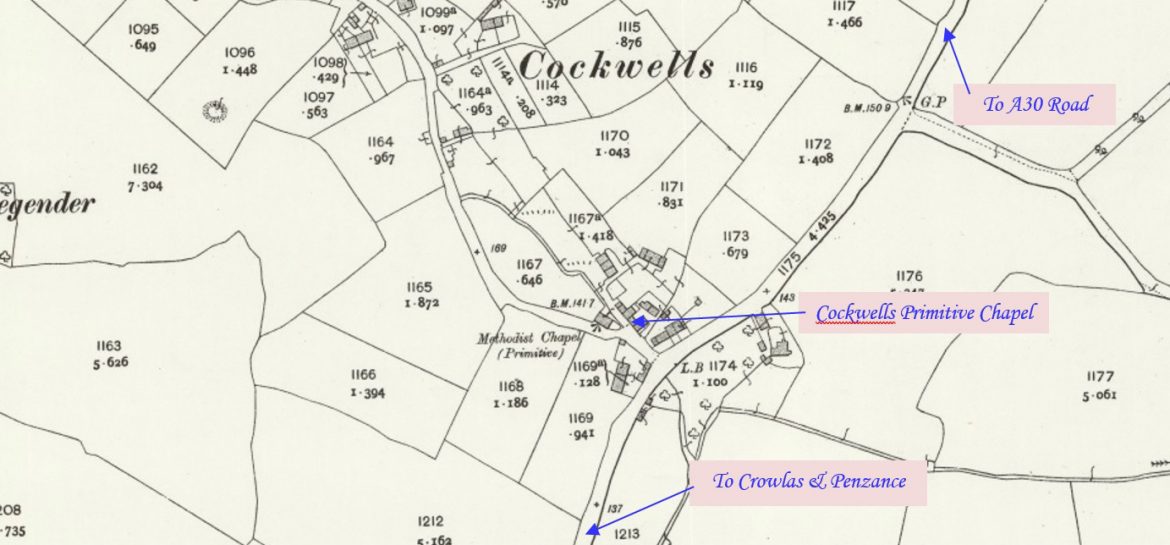
Cockwells is a small hamlet situated near Crowlas in the Penwith area, on the busy A30 road leading to Penzance. Today it is surrounded by fields, farming everything from daffodils to broccoli. The chapel is situated off this road at a major bend. Adjacent to the chapel is a row of small cottages. This profile of Cockwells Primitive Chapel has been compiled by Val Thomas of St Ives Old Cornwall Society.
The bulk of the research for this chapel was online on a website called ‘My Primitive Wesleyans’ and was attributed to David Cracknell and Christopher Hill (01/05/2017)
1851 The census shows Nathaniel Williams, age 46, and a miner living in Cockwells. There are 10 in the house and all the boys older than 12 are tin miners. There are 15 homes registered and all the families are linked to tin mining.
1857 T Pascoe was appointed to mission the village and encouraged by the attendance at an outdoor meeting by a furze rick, arranged for meetings in a barn. He initially visited house to house, leaving tracts and inviting people to a service. It was reported that he had a “tolerably large and deeply attentive congregation”. Apparently the people asked for two services on a Sunday and a midweek one. The fledgling congregation used a barn over the winter, but, as it was too small, it was decided a chapel would be built. The present owners, who live in the adjoining cottage, state from their research, that it took four months and was hard work and many a deal was done to achieve this.
A piece of land was leased by Nathaniel Williams, yeoman, of Ludgvan, which was part of the manor of Tregender in Ludgvan. This had been leased in 1841 by Gordon William Francis. Also on the lease document are Benjamin Bosence, woolstapler, Robert Molesworth, coach maker, William Henry Penhaligon, hairdresser all of Penzance, and Thomas Pascoe, miller and William Gilbert, smelter of Gulval. Mr. R.V. Hosking, a Wesleyan class leader, offered as much stone as was needed and “scores of hard, horny, honest hands” cleared the site and dug the foundations. The men collected 50 loads of stone, as well as clearing the site and digging the foundations, whilst others lent a hand in the fields with the harvest so that they could get the loan of horses to aid the transportation of building materials. Also £20.00 in cash was raised.
1858 The foundation stone was laid on Sunday 6th September 1858. “It was a bright, sunny day: the air was redolent with the perfume of wild thyme and heath; there were players upon instruments”. The sermons were given by T. Pascoe, C. Kessel and Mr. Powell.
On the 19th December the chapel opened and ministers of several denominations were present. The cost was £130, with £60 of it remaining as debt.
The Cornish Telegraph of Wednesday December 22nd reported:
The first Trustees were Penzance men, who were also on the deeds for nearby Madron. They were Robert Thomas, coach builder, William Penhaligan (hairdresser), Joseph Clements (warehouseman) and Benjamin Bosence (wool-stapler) plus Thomas Pascoe (miller) and William Gilbert (smelter) from Gulval. Probert says his research suggests this shows a lack of leadership as the same names appear in connected to several other chapels. Apparently when researching this information it was found that Cockwells was often mistakenly called Crowlas.
1859 The opening of the chapel is described by E. Powell in the 1859 Primitive Methodist magazine.
‘A tea meeting was held last Monday evening when upwards of 100 persons partook of an excellent repast of tea and cakes. A Public meeting was subsequently held, presided over by Mr R. Thomas and addressed by Revs. H. Worth and E. Powell etc….. The interest created in this place is of a very pleasing and encouraging nature, the chapel being crowded whenever it is opened for divine worship.’ –The Cornish Telegraph, Wednesday January 19th.
1861 In the census for Cockwells village only 8 families are named, and all are miners.
1879 Mr J. Tancock led the annual missionary service at Cockwells according to the Cornish Telegraph of the 28th January.
1880 The Cornish Telegraph Wednesday August 18th. The Sunday School Centenary.
1882 March 9th Cornish Telegraph. ‘Revival services have commenced. Meetings are held each evening, and conducted by members of the congregation’.
1883 A service of song was given by the Penzance choir on Sat evening – 12th July ‘The Cornishman’.
1895 The anniversary services of the Cockwells Primitive Methodist Sunday school were held on Sunday. The weather being delightfully fine, the services were held in a field kindly lent by Mrs Hosking. There was a choir and musical entertainment in the evening when the organ was played. – August 17th ‘The Cornishman’.
1901 Chapel anniversary
1904 The harvest festival service was held on Sunday afternoon and evening. ‘The building presented a very pleasing appearance being decorated with flowers and fruit.’ A fair number attended the sale on Monday evening. -The Cornishman, Thursday October 6th.
1931 The Cornishman 1st January reported that an inquest had taken place in the Chapel.
1932 The Primitive chapel became Cockwells Methodist Chapel.
The Angarrack Chapel choir sang at the harvest service on the Sunday afternoon. The chapel was packed to its utmost capacity on the Sunday and Monday. – The Cornish Telegraph Thursday 13th October.
1936 The congregation was down to two people.
1940 The chapel closed and used as a store. The chapel is now a ruin. The owners of the adjacent house have bought it and are sympathetically preserving and stabilising it.
Images: My Primitive Methodists. David Cracknell These photographs show it to be a square building of rubble stone with some brick in the lower portion of the windows. The doorway has a carved slate plaque denoting the date, and the doorstep remains with an iron boot scraper.
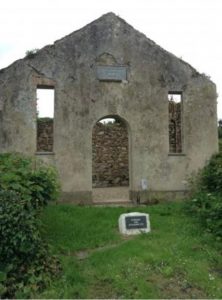
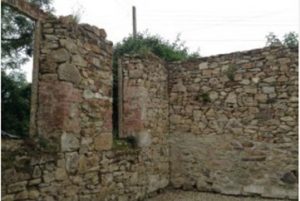
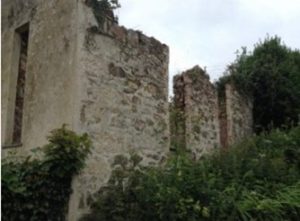
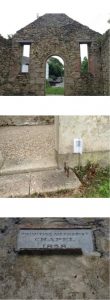
(Images from: ‘geograph.org.uk’ – taken by Dennis White and Graham Horn)
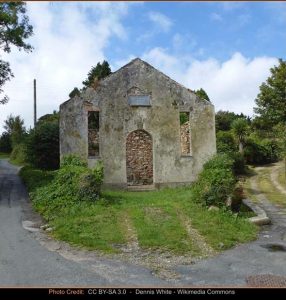
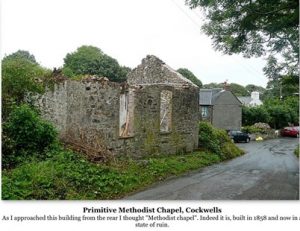
The following documents are available at Kresen Kernow:
Lease, site for Cockwells Primitive Methodist Chapel, Ludgvan. MRPZ/111 dated 28th August 1858
My Resources:
National maps of Scotland
‘Find my Past’ for newspaper cuttings.
My Primitive Methodists.
The resources used by Christopher Hill are:
Primitive Methodist Magazine, November 1858 pp. 685-696
Primitive Methodist Magazine 185, P.241
JCC Probert, Primitive Methodists in Cornwall, Page 71.
